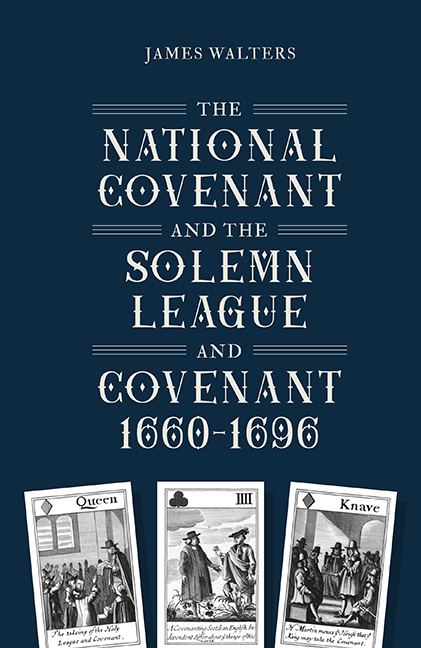Book contents
- Frontmatter
- Contentst
- List of Illustrations
- Acknowledgements
- Introduction
- 1 The 1638 National Covenant and the 1643 Solemn League and Covenant
- 2 1660: What Was to Be Restored?
- 3 The Act of Uniformity and the ‘Great Ejection’
- 4 Crisis and Toleration in the 1660s
- 5 Exclusion and Association in the Late Restoration Period
- 6 The Revolution of 1688 and the Association of 1696
- Conclusion
- Bibliography
- Index
- STUDIES IN EARLY MODERN CULTURAL, POLITICAL AND SOCIAL HISTORY
4 - Crisis and Toleration in the 1660s
Published online by Cambridge University Press: 26 May 2022
- Frontmatter
- Contentst
- List of Illustrations
- Acknowledgements
- Introduction
- 1 The 1638 National Covenant and the 1643 Solemn League and Covenant
- 2 1660: What Was to Be Restored?
- 3 The Act of Uniformity and the ‘Great Ejection’
- 4 Crisis and Toleration in the 1660s
- 5 Exclusion and Association in the Late Restoration Period
- 6 The Revolution of 1688 and the Association of 1696
- Conclusion
- Bibliography
- Index
- STUDIES IN EARLY MODERN CULTURAL, POLITICAL AND SOCIAL HISTORY
Summary
The 1660s saw the jubilation that many had experienced at the Restoration turn to concern as the British kingdoms were rocked by a series of crises. The Covenants continued to be discussed, in both favourable and unfavourable terms, throughout this period. London was struck by plague in 1665, and fire the following year, and war broke out between England and the Dutch Republic. In the fevered atmosphere surrounding these crises, fears grew of the threat posed by nonconformist plots and violence, and some feared that the Covenants would re-emerge as instruments or inspirations for sedition. In many accounts, Covenanters and presbyterians are considered as schismatic dissenters or malefactors akin to Jesuits and Quakers. However, others argued that the Solemn League and Covenant represented a solution to the instability of the Restoration settlement which was becoming increasingly apparent.
The political theories which surrounded discussion of the Covenants evolved in interesting ways in this period, with proponents of the Covenants conceiving of them in ways which did not involve so rigid a separation of the ‘two kingdoms’ of church and crown as had the theories of the Scottish reformation from which they had emerged. Even as the weaknesses of the Stuart monarchy and the religious settlement of 1662 became more apparent throughout the 1660s, the crown in England remained in a stronger position than ever it had in Scotland, and this situation is reflected in discussions and theories around the Covenants. The Solemn League and Covenant continued to be thought of as a solution to the problems of religious and civil power in the British kingdoms, which entangled the fortunes of church and crown while theoretically elevating neither above the other. If the conception of a constitution for the British kingdoms embodied by the Solemn League and Covenant was to be realised, its proponents reasoned, this constitution would have protected and strengthened both church and crown. Through the means of the oath embodied by the Covenant, the inherent sovereignty of the people would be channelled into loyalty to the king, and the king bound in sight of God to uphold and defend the true religion. However, while the problems with the Restoration settlement became more apparent, the rigid ecclesiastical demands and political instability that many saw as embodied by the Solemn League and Covenant prevented it from functioning in practice as a unifying form of civil religion.
- Type
- Chapter
- Information
- Publisher: Boydell & BrewerPrint publication year: 2022

